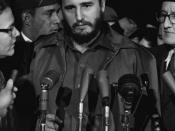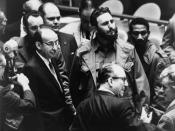The revolution in Cuba was not a result of economic deprivation, nor because of high expectations in the economy, it was the political factors and expectations which evoked the civilians to revolt. The Cuban economy was moving forward at the time before the rebellion but the dominant influence of the sugar industry made the economy "assymetrical" and encouraged no "dynamic industrial sector". Because of the dependance on sugar, the unemployment rate ranged between 16 and 20% rising and falling with sugar prices, ebbing and flowing as the season changed. The rural wage levels were incredibly unsteady and unpredictable; the standard of living was low. Dependance on the sugar industry did not retard the economy of Cuba, just the wages of its workers. It was the leaders of the nation who reaped profit from this dependance, and it was the leaders of the nation who insisted on keeping the nation the way it was.
By the mid 1950's, however, the middle class had expanded to 33% of the population. Democracy, as we know it, broke down: the large middle class did not assert democratic leadership, there was no social militancy in the working class ranks, and the people found order preferable to disarray. Batista could no longer legitimize his regime . Failure in the elections of 1954 showed the discontent of the people, and failure in communications with the United States illustrated its discontent. Finally, opposing forces confronted Batista's power: there were street protests, confrontations with the police, assault, sabotage, and urban violence. This began the revolution in Cuba. America, with its stubborn ideas and misjudgements of character, forced Castro to turn to the Soviets for alliance and aid. When Castro visited the United States in April, 1959, there were different respected individuals holding different views of him and his future...


